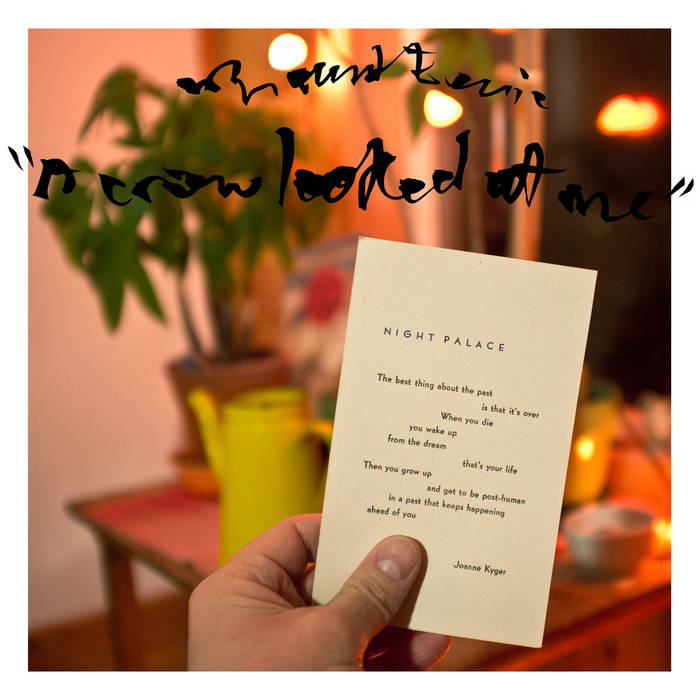Mount Eerie – A Crow Looked at Me LP P.W. Elverum & Sun
$ 18,98 Original price was: $ 18,98.$ 11,39Current price is: $ 11,39.
Phil Elverum is so skilled at expressing spirituality and mortality in his work as Mount Eerie that it’s convenient to say he’s unusually equipped to transform the loss of his wife, musician/writer/visual artist Geneviève Castrée, into something profound and beautiful. However, this is exactly what he doesn’t do on A Crow Looked at Me. Arriving less than a year after her death from stage-four pancreatic cancer in July 2016, the album is an instinctive, reflexive reaction to the fact that the woman he loved and the mother of his child is dead. Elverum doesn’t aspire to teach anyone else about death or love or coping. Instead, these messages to her and about her, loosely wrapped in music, are a way for him to be with her a little longer, and as he documents their life together and its end, he immerses listeners in his loss.
Where Mount Eerie’s previous album, Sauna, was fittingly foggy and contemplative, A Crow Looked at Me is grounded in reality. Recorded in Castrée’s studio with her instruments, Elverum layers glowing acoustic guitars over a drum machine that hisses like a respirator as his thoughts pour out in forms too raw for verses or choruses, while his mood ranges from painfully intimate to funny and, above all, loving. After describing spreading her ashes, Elverum sings “I don’t think of that dust as you/You are the sunset.” As Mount Eerie and with the Microphones, he’s written enough about death in the abstract to make the difference on A Crow Looked at Me palpable. “Death Is Real” opens the album and winds through it like a mantra, with lyrics like “There is nothing to learn/Her absence is a scream” and “Conceptual emptiness was cool to talk about before I knew my way around these hospitals” providing a constant reminder.
On these songs, Elverum doesn’t aim for the heart so much as the gut — it’s physically wrenching hearing him recount how he met Castrée, how he threw out the last of her trash after she died, and — perhaps most cruelly — how photographs began replacing his memories of her. His offhanded mentions of anguish (“the room I still don’t go into at night”) cut much deeper than a showier display of feeling, while his descriptions of his lingering loss (“what was you now borne across waves, evaporating”) frequently manage to be harrowing and beautiful at the same time. As A Crow Looked at Me draws to a close, Elverum allows himself a little more distance and artistry, bringing his beloved black metal guitar back on “Sonia Moria” and addressing the final song, “Crow,” to his daughter. Sharing his loss on A Crow Looked at Me doesn’t diminish its impact at all — even within Mount Eerie’s body of work, this is a remarkably powerful and pure album. -All Music Guide
Fast Shipping and Professional Packing
We offer a broad range of shipping options due to our long-running partnerships with UPS, FedEx and DHL. Our warehouse employees will pack all goods to our exacting requirements. Your items are carefully inspected and secured properly prior to shipping. We ship to thousands of customers every day from all over the world. This demonstrates our dedication to becoming the largest online retailer in the world. Warehouses and distribution centres can be located in Europe as well as the USA.
Note: Orders that contain more than one item will be assigned a processing date depending on the item.
We will carefully examine all items before sending. Today, the majority of orders will be shipped within 48 hours. The expected delivery time will be between 3 and 7 days.
Returns
Stock is dynamic. It's not completely managed by us, since we have multiple entities, including the factory and the storage. The actual inventory can fluctuate at any time. It is possible that the stocks could be depleted after your order has been processed.
Our policy lasts 30 days. If you haven't received the product within 30 days, we're not able to issue a refund or an exchange.
To be eligible for a refund the product must be unopened and in the same state as when you received it. The item must be returned in its original packaging.
Related products
Vinyl
Acid Mothers Temple & Melting Paraiso U.F.O. – Hallelujah Mystic Garden Part 1 LP Important Records
Vinyl
Acid Mothers Temple & Melting Paraiso U.F.O. – Hallelujah Mystic Garden Part 2 LP Important Records
Vinyl
Vinyl
Vinyl


































